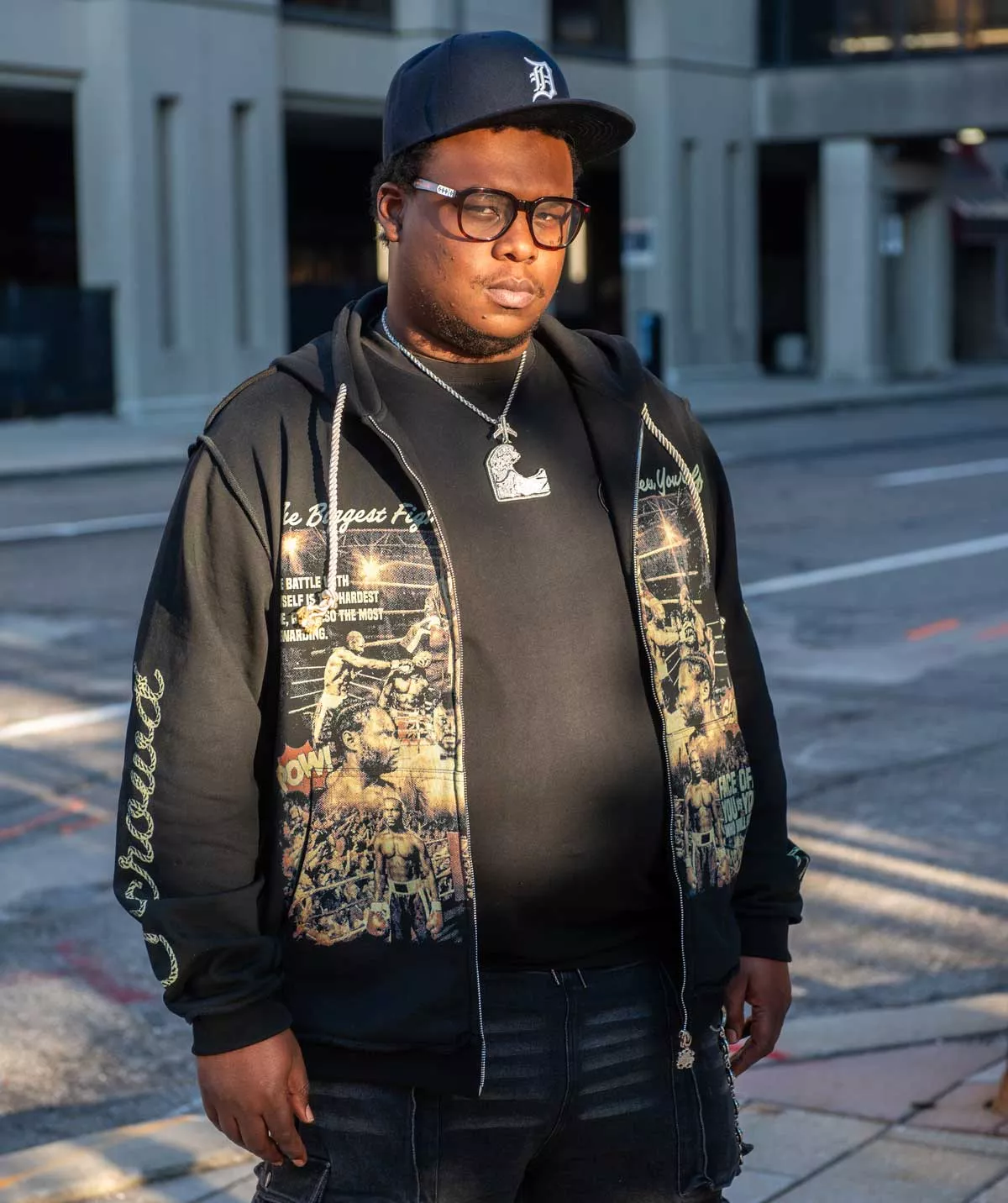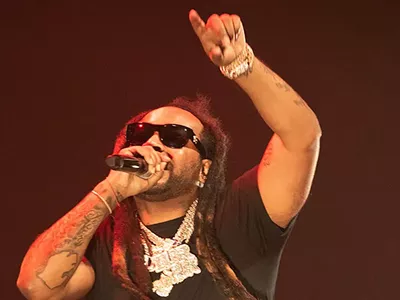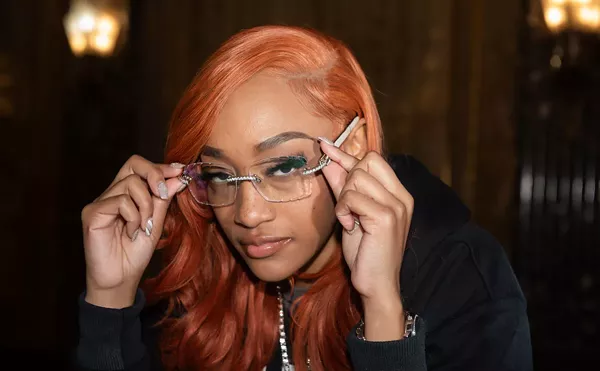After-hours inside the Fisher Building feels like the movie Night at the Museum. There’s no show tonight so shops are closed, security guards are bored, and the birds painted between the marble and granite feel like they could be ready to come alive at any time.
Hip-hop artist Samuel Shabazz is here with his manager and friend Diego, dressed in a black hoodie, shorts, and Detroit Air Jordan 2s. They’re talking sales, streams, and how Shabazz’s 2021 track “Houston Babies” has over a million YouTube views without even being on Apple Music or Spotify. “We really need to put that on DSPs, it will probably do a million more,” Shabazz says.
Shabazz has evolved into one of Detroit’s most talented and versatile artists. On any given track he can go from being a Detroit Dom Kennedy to a trap T-Pain. He essentially grew up in the business as his dad was Uncle Sam, a Detroit-born crooner who was the first artist signed to Boyz II Men’s Stonecreek Records. In 1997, Uncle Sam’s self-titled album went gold on the success of his platinum single “I Don’t Ever Want To See You Again.” As a 5-year-old, Shabazz toured with his dad and got an early taste of the music business.
“I would introduce him to 20,000 people,” he recalls. “They were yelling my name back to me: ‘When I say Uncle, y’all say Sam.’ It’s a lot of memories I got from there.”
The experience was enough to spark his interest in music and within a few years he was taking pen to pad.
“I just started falling in love with music and I was just trying to figure out how I was going to make music,” he says. “I didn’t know if I was going to sing or rap, I didn’t know how I was going to do it. But when I turned 8, I wrote my first rap. Me and Diego in the classroom, we wrote our first rap.”
Shabazz grew up on the west side of Detroit but went to high school in Douglasville, Georgia, a Black suburb outside of Atlanta. It was the late 2000s: Jeezy, T.I, and Gucci Mane were making Atlanta trap the new face of hip-hop, while Big Sean, Team Eastside, and Doughboyz Cashout reigned supreme in Detroit. By this time Shabazz had picked up the moniker Prince of the D and enrolled in Full Sail University, where he obtained a bachelor of science in audio arts. The added skillset allowed Shabazz to take full control over his sound and saved him a few dollars because he didn’t need anyone to master his albums. “I don’t produce but I do mix and engineer my own music,” he adds.
By 2014 Shabazz had released a half-dozen projects on his Bandcamp page. Although many of them stayed below the radar, 2012’s Everything is Evarything and 2014’s Never Die Alive both stood out and helped Shabazz grow his following. Shortly after, he met Detroit emcee and Team Eastside alum Babyface Ray through Diego.
“We seen each other in passing a couple of times, and one day we officially got in the studio together and made music and never stopped, really,” Shabazz says.
The duo released #FreeDiego in 2016, and soon after Shabazz dropped Walk on Water, a project he refers to as his “first non-ghetto album.” Earlier this summer, Shabazz signed a record deal with Babyface Ray’s Wavy Gang imprint, a partnership that Ray has with Empire.
“Ray started his label and I wanted to be a part of it and make sure everything just started off well,” Shabazz says. “I know that’s a whole different hat he’s putting on. I wanted to try and make it easier for all of us to an extent.”
In June, Shabazz released PLANEBOY, his most acclaimed album to date.
On its track “Life Gets Hard,” Shabazz is in his lyrical trap bag as he raps, “When nights get hard, that’s when I see the moon the most/ Make it look easy like I breed, the central score/ One false move and we gon’ take it coast to coast/ Blew past niggas, brodie used to play the blow.”
On tracks like “Say Yes” and “Pull Me Back,” Shabazz leans on heavily synthesized vocals over soulful R&B production. “That’s Dre Butterz, most of that,” Shabazz says. “I heard Dre Butterz’s ‘Pull Me Back’ and I stopped the presses — like pull this song up, I gotta fit my way in there.”
When in the studio Shabazz punches in his bars after letting the beat talk to him a bit. He has a firm grasp of what his sound is, and the consistency shows across his body of work. Even though Shabazz uses multiple producers, he maintains his same sonic presence, and there’s a strong melodic groove that exists in his projects that’s unique to him.
“I’m really into my sound heavily, so I really listen to every song from beginning to end,” he says. “And I listen if the next song goes into the next song sonically.”
Because Shabazz has nearly three dozen projects accessible on multiple platforms, his progression can be heard. In an era where many artists remove their early projects, Shabazz is comfortable with his musical story being told. “Beats got better, rapping got better, I got better at song structure, singing songs, just learning from my mistakes … it’s all science to me,” he adds.
Outside of releasing music Shabazz dropped a freestyle on On The Radar, gave a tight performance on In The Field, toured with Babyface Ray and Jack Harlow on the “Creme de la Creme” tour, and was one of the main openers on last year’s “Courtesy of the Mob” tour with Ray. “I was opening that one up, I was doing a job every night to make sure everyone was ready to get it going,” he says.
Shabazz is a testament to staying the course. His discography and consistency can be attributed to this love of music more than him chasing notoriety and sales. “It was never for me to gain the world, it was for me to give something to the world,” he says. He cites a brief moment in 2019 in which he thought about giving up on music but quickly changed his mind and pushed through it. His journey has made him more thankful than regretful. “I don’t really regret nothing,” he says. “It’s nothing I can take back or switch up. I appreciate every lesson when they come because everything be necessary for the time.”
Moving forward, Shabazz plans on doubling the size of his discography. There are more singles and visuals from PLANEBOY he plans to drop along with another mixtape or album before year’s end. For the last four years Detroit has had one of the hottest hip-hop scenes in the country, but as more artists enter the playing field, Shabazz believes his authenticity will stand tall and allow him to hit the next level of his career.
“I don’t compromise,” he says. “It’s honesty for them. Like truthful music. I talk about stuff that people don’t get to talk about, even to the women or to their friends. I say stuff people are thinking. They can tell I still care to make good songs.”








